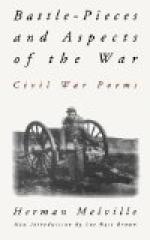Produced by David Maddock
Battle-Pieces and Aspects of the War.
By Herman Melville.
1866.
The Battle-Pieces in this volume are dedicated to the memory of the three hundred thousand who in the war for the maintenance of the Union fell devotedly under the flag of their fathers.
[With few exceptions, the Pieces in this volume originated in an impulse imparted by the fall of Richmond. They were composed without reference to collective arrangement, but being brought together in review, naturally fall into the order assumed.
The events and incidents of the conflict—making up a whole, in varied amplitude, corresponding with the geographical area covered by the war—from these but a few themes have been taken, such as for any cause chanced to imprint themselves upon the mind.
The aspects which the strife as a memory assumes are as manifold as are the moods of involuntary meditation—moods variable, and at times widely at variance. Yielding instinctively, one after another, to feelings not inspired from any one source exclusively, and unmindful, without purposing to be, of consistency, I seem, in most of these verses, to have but placed a harp in a window, and noted the contrasted airs which wayward wilds have played upon the strings.]
Hanging from the beam,
Slowly swaying (such the law),
Gaunt the shadow on your green,
Shenandoah!
The cut is on the crown
(Lo, John Brown),
And the stabs shall heal no more.
Hidden in the cap
Is the anguish none can draw;
So your future veils its face,
Shenandoah!
But the streaming beard is shown
(Weird John Brown),
The meteor of the the war.
When ocean-clouds over inland hills
Sweep storming in late autumn
brown,
And horror the sodden valley fills,
And the spire falls crashing
in the town,
I muse upon my country’s ills—
The tempest bursting from the waste of
Time
On the world’s fairest hope linked with man’s
foulest crime.
Nature’s dark side is heeded now—
(Ah! optimist-cheer disheartened
flown)—
A child may read the moody brow
Of yon black mountain lone.
With shouts the torrents down the gorges
go,
And storms are formed behind the storm
we feel:
The hemlock shakes in the rafter, the oak in the driving
keel.
The Conflict of Convictions.[1] (1860-1.)
On starry heights
A bugle wails the long recall;
Derision stirs the deep abyss,
Heaven’s ominous silence over all.
Return, return, O eager Hope,
And face man’s latter fall.
Events, they make the dreamers quail;
Satan’s old age is strong and hale,
A disciplined captain, gray in skill,
And Raphael a white enthusiast still;
Dashed aims, at which Christ’s martyrs pale,
Shall Mammon’s slaves fulfill?




